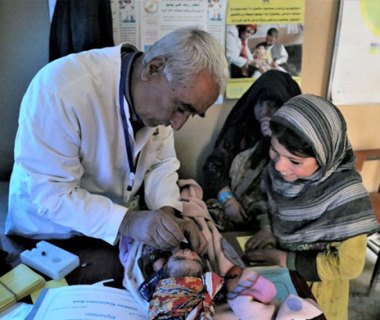 13 December 2017, Cairo ‒ At least 3.5 billion people, or half of the world’s population, cannot obtain essential health services and each year, larger numbers of households are being pushed into poverty because they have to pay for health care out of their own pockets a new report from the World Health Organization and World Bank has revealed.
13 December 2017, Cairo ‒ At least 3.5 billion people, or half of the world’s population, cannot obtain essential health services and each year, larger numbers of households are being pushed into poverty because they have to pay for health care out of their own pockets a new report from the World Health Organization and World Bank has revealed.
The release of the report coincides with Universal Health Coverage Day, commemorated each 12 December, which is the anniversary of the first unanimous United Nations resolution calling for countries to provide affordable, quality health care to every person, everywhere without exposing people to financial hardship.
Currently, 800 million people spend at least 10% of their household budget on health expenses. For almost 100 million people these costs have been enough to tip them into extreme poverty, forcing them to survive on just US$ 1.90 or less a day. Universal health coverage means health for all, an idea which is embedded in the human right to health. It is completely unacceptable that half the world still lacks coverage for the most essential health services,” said Dr Tedros Adhanom Ghebreyesus, Director-General of the World Health Organization. “And it is unnecessary. A solution exists: universal health coverage allows everyone to obtain the health services they need, when and where they need them, without facing financial hardship.”
In the Eastern Mediterranean Region, around 40% of health expenditure comes directly from people’s pockets; the majority of whom cannot afford it. People with low incomes and without social protection are the hardest hit. As a result, an estimated 7.5 million people are pushed into poverty every year in the Region due to spending on health. Universal health coverage has a special relevance to people living in countries with acute and prolonged emergency situations, noting that half of the world’s internally displaced populations are living in countries of the Region and more than 60% of the world’s refugees and migrants originate from the Region.
The essence of universal health coverage is the provision of a basic package of health services to the whole population and ensuring that those who cannot pay for health care are financially protected through prepayment schemes. Every country can make progress towards universal coverage, even low-income countries and those affected by emergencies.
Target 3.8 of the Sustainable Development Goals relates specifically to universal health coverage and most countries in the Region have already adopted universal health coverage as a national vision through developing policies to achieve the health-related targets of the United Nations 2030 Sustainable Development Agenda.
Related links
WHO-World Bank: tracking universal health coverage; 2017 global monitoring report


